With August well underway, the University of Macau (UM) is excited to welcome over 5,600 new students from around the world. Filled with excitement, curiosity, enthusiasm, and anticipation, these students are ready to start their new journey at the university. To help them settle into university life and get off to a strong start with their studies, UM’s departments have come together to organise a variety of orientation activities. From the formal convocation and engaging residential college orientations to academic advising and library workshops, these carefully planned events are designed to provide comprehensive support for new students as they integrate into the UM community and embark on their academic adventures.
‘The Way to UM’: A thorough guide to starting the new journey
A key component of these efforts is ‘The Way to UM’—a comprehensive orientation programme packed with thoughtfully planned activities. They include in-depth faculty introductions, a lively student fair, a Macao Cultural Festival showcasing local characteristics, and inspiring special lectures. This diverse lineup ensures a truly enriching experience for new students.
Among the highlights are the solemn flag-raising ceremony at UM Lotus Square and the formal convocation at the Sports Complex. These events bring together new undergraduate and postgraduate students to celebrate the start of a new chapter in life. Io Sao Lai, head of the Student Development Section and coordinator of ‘The Way to UM’ programme, explains the importance of these events. She emphasises that the flag-raising ceremony aims to promote love for the country and Macao, while the convocation is much more than a formality—it marks a significant transition from secondary school to university or from undergraduate to postgraduate studies. ‘Through these solemn and heartwarming events, we aim to help new students build a strong sense of belonging and pride in being a UM student,’ Io says. At the convocation, UM Rector Yonghua Song delivers the ‘First Lecture of University’, providing an insightful overview of the university’s history, core educational philosophy, and unique strengths. He also highlights UM’s impressive international collaboration networks and strategic partnerships.
UM’s orientation activities are tailored to meet the needs of different student groups. For undergraduates, the focus is on residential college education and adapting to campus life. During the ‘First Step to UM’ activity, Mok Kai Meng, vice rector of UM, explains the essence of whole-person education. In addition, the Student Affairs Office and Office of Sports Affairs introduce campus resources and regulations, while representatives from the UM Students’ Union provide a detailed overview of its structure and operations. For postgraduate students, the orientation activities emphasise academic development, research resources, and cross-disciplinary collaboration. These sessions also cover student care services, support policies, and safety protocols, ensuring a smooth transition from settling in to pursuing professional growth.
The successful organisation of ‘The Way to UM’ is a result of collaboration and careful planning among various UM departments. Io shares that preparations began as early as last November. The team draws on the expertise of faculties, residential colleges, the Graduate School, the Registry, and other academic and administrative units to ensure everything is executed to the highest standard. Io expresses gratitude to all UM members for their dedication and support, saying, ‘Orientation activities are not just a way for new students to learn about UM, but also an opportunity to showcase our team spirit. The happy faces of our new students are the best reward for our efforts.’
Residential colleges: More than just a place to stay
At UM, residential colleges are the ‘home away from home’ for undergraduate students. Faculty and administrative staff at each college have worked tirelessly to prepare for the arrival of new students. Every detail—from facilities to activities—has been thoughtfully planned to help students settle in and adjust to their new lives both physically and emotionally.
To welcome the new students, preparations started during the summer break. Rooms underwent repairs, common areas were renovated, and deep cleaning was carried out in both individual rooms and shared spaces. Inspections of beds, desks, chairs, air conditioners, and other amenities were also conducted to ensure a comfortable and well-equipped living environment for the incoming students.
In the new residential college environment, students not only learn to live independently but also develop the necessary skills to interact and collaborate with peers from all over the world, as they share rooms with other students from different majors. Chang Kit Peng, a resident fellow in Henry Fok Pearl Jubilee College, emphasises that alongside their academic pursuits, students also need to learn to take care of themselves, communicate with others, and take responsibility for their living spaces and the college environment. This represents an important phase of personal growth, where students transition from being looked after to taking on caregiving roles, and from following others to stepping into leadership positions.
Chang points out that residential colleges provide an environment where new students learn to become better versions of themselves. One key venue where this growth happens is the dining hall of each college, where orientation dinners are hosted, and college masters give welcome speeches to the incoming students. These events often feature guests from diverse backgrounds, who share their insights and life stories to inspire students. In addition, each college operates a communal dining system. ‘We invite professors from various faculties to join students for meals, creating a relaxed atmosphere for discussions about academics, study tips, and even advice on further education. Students are also encouraged to take the initiative to invite faculty members to dine with them, which helps bridge the gap between faculty and students,’ Chang explains.
Compassionate support is another cornerstone of residential college education. Tommy Chan, a resident fellow in Cheong Kun Lun College, shares that every new student is assigned a college faculty member—either the college master or a resident fellow—as their mentor throughout their university journey. Students can turn to their mentor for help with challenges in everyday life, academics, or future plans. Moreover, colleges and student leaders organise a variety of orientation activities to help new students build connections, expand their social networks, and become familiar with the college environment and facilities.
University is a critical period for self-discovery. Dr Chan highlights that all resident fellows are certified Global Career Development Facilitators. ‘We conduct one-on-one interviews with every new student and hold regular check-ins to help them improve their career adaptability, develop a plan for their studies, and make the most of their four years at university. Our goal is to prepare them for their future careers while ensuring they have a rewarding and fulfilling university experience,’ he explains.
Faculty support: Strengthening faculty-student and peer relationships
At UM, faculties play a critical role in fostering academic development. To address the different needs between undergraduate and postgraduate students, faculty and administrative staff have developed tailored orientation support programmes. For example, the Faculty of Science and Technology (FST) has revamped its orientation format. While keeping its traditional undergraduate orientation, the faculty has introduced a platform for postgraduate students to build connections. Guided laboratory tours and informal meetings with deans and professors are also organised to meet these students’ academic and professional needs.
Lam Chi Chiu, assistant dean (Student Affairs) of FST, explains that undergraduate students often naturally form tight-knit peer groups through faculty-led orientations. However, postgraduate students, with their distinct learning paths, often find it harder to connect with others. To address this, FST has launched a new initiative since last year. It hosts a postgraduate orientation exchange session during the first week of the academic year. This event offers new postgraduate students a chance to meet professors face-to-face and build connections.
Prof Lam notes that while undergraduate students typically focus on adjusting to university life, postgraduate students are more concerned with bolstering their professional skills. However, many of them lack a clear understanding of the faculty research environment. To address this, FST organises visits to key laboratories before the exchange session. During these tours, faculty members introduce important equipment and ongoing research projects, helping students gain a broader perspective on their fields of study.
After the laboratory tours, students meet with the dean in a learning common. Over coffee and light refreshments, faculty and students engage in open conversations, while student performances add a lively and welcoming touch to the event. Prof Lam says, ‘Master’s students often have to balance work and studies, so having a strong support network is crucial. Last year’s exchange session attracted over half of the new students, and we saw a noticeable increase in students proactively reaching out to faculty members afterwards.’
UM also has a mentorship scheme in place, where every new student is assigned a department professor as their academic mentor. Each faculty also hosts orientation sessions for undergraduate and postgraduate students, where professors explain programme structures, compulsory and elective course requirements, graduation criteria, and potential career paths. Several faculty departments have set up WeChat groups to share updates and information about research opportunities. In addition, students can apply to join professors’ research teams, which enables them to have an early start in research and build a strong foundation.
Library support: Enhancing students’ information literary
As the university’s knowledge hub, the UM Library houses a vast array of academic resources. To help new students navigate these resources effectively, the library has developed a series of orientation activities. These sessions provide structured guidance to help new students quickly learn how to access both physical and digital resources, laying a strong foundation for their academic success.
Librarian Henry Yang explains that the orientation activities are designed to provide students with multiple opportunities to learn about library services. For example, physical guided tours are offered one week before and one week after the start of the semester. During these tours, librarians guide new students through the library, explaining its layout and providing tips for locating academic resources. They also demonstrate how to use the library’s collection catalogue system to search for print and electronic materials, ensuring students can access resources efficiently.
To maximise participation, the library has also introduced an interactive activity called ‘Library Survival Challenge’. This game features scenario-based tasks at 12 key academic service points throughout the library, including database searches, plagiarism checks, and cross-library document retrieval. By completing these tasks, students can quickly learn how to locate resources and access academic support services. As an added incentive, those who successfully complete the challenge will receive reward souvenirs.
In addition to orientation activities, the UM Library offers competency-based workshops tailored to students at different stages of their academic journey. For new undergraduate students, the library offers a foundational course, introducing essential skills such as database searching and Turnitin originality checking, equipping them to complete coursework more effectively. For senior undergraduates and postgraduate students, advanced workshops provide deeper insights into professional database applications, patent analysis, and AI research tools, empowering them to enhance their academic productivity.
Dr Yang stresses that the library is far more than just a place to borrow books; it is a critical resource hub throughout students’ academic journey. ‘New students can significantly improve their information literacy skills by taking part in orientation activities and consulting with librarians. Instead of scrambling to catch up after the semester starts, they should proactively master these essential skills early on to achieve better results in their university studies,’ he says.
Guiding new students with essential information and support
As new students arrive on the UM campus, they are greeted by warm messages displayed on outdoor light boxes and television screens in various buildings. These thoughtful messages, designed by the Communications Office, are delivered via both online and offline channels to foster a warm and inviting atmosphere. Each student also receives a university welcome card, and by following UM’s official social media accounts, they can access illustrated guides, practical daily life tips, and the latest updates on food, accommodation, transport, and academics. Important orientation information is also disseminated through electronic bulletin boards, while vibrant welcome videos are broadcast on campus TVs.
Supporting students every step of the way
From the moment new students arrive at their residential colleges or postgraduate houses with their luggage, receive their student cards, and attend Rector Song’s ‘First Lecture of University’ at the convocation, they officially become part of the UM family. As they embark on this new academic journey, the entire UM community stands ready to support them at every step, from initial adaptation to long-term academic growth, ensuring a successful and enriching university experience.
Chinese Text: Kelvin U
Chinese Editor: Gigi Fan
English Translation: Bess Che
Photo: provided by interviewees
Source: My UM Issue 145
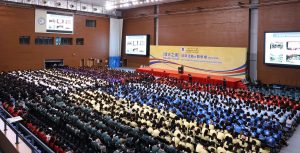
UM welcomes over 5,600 new students at the convocation
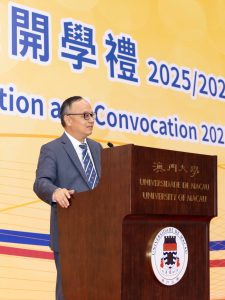
Prof Yonghua Song delivers the ‘First Lecture of University’
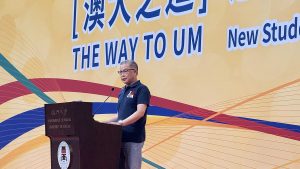
Prof Mok Kai Meng delivers the ‘First Step to UM’
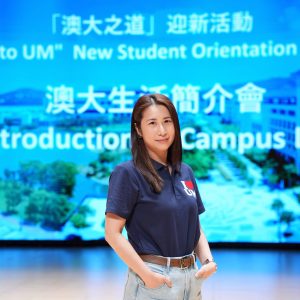
Io Sao Lai
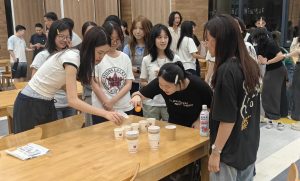
Residential colleges hold orientation activities for new students

Chang Kit Peng
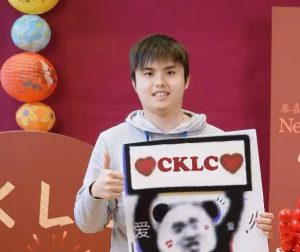
Dr Tommy Chan
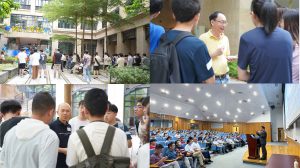
FST organises an orientation exchange session for new postgraduate students
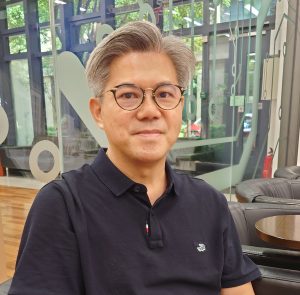
Prof Lam Chi Chiu
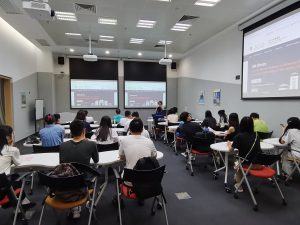
UM Library organises a series of workshops for new students
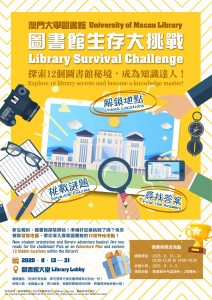
UM Library introduces a ‘Library Survival Challenge’
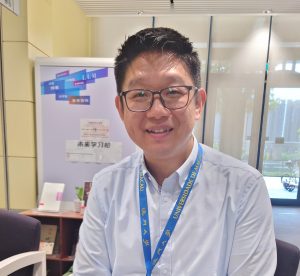
Dr Henry Yang
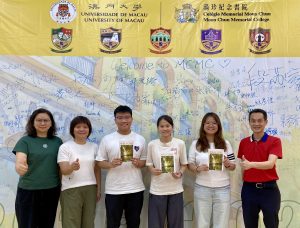
UM sends a welcome card to every new student
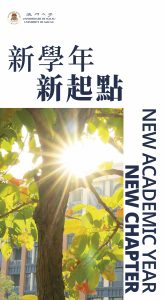
The ‘New Academic Year, New Chapter’ lightbox design across the campus
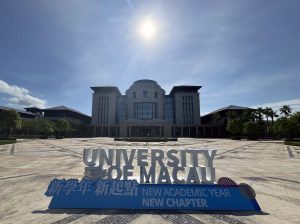
The ‘New Academic Year, New Chapter’ installation at the Library Plaza
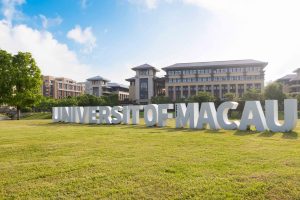
The campus is buzzing with excitement as the new academic year starts
